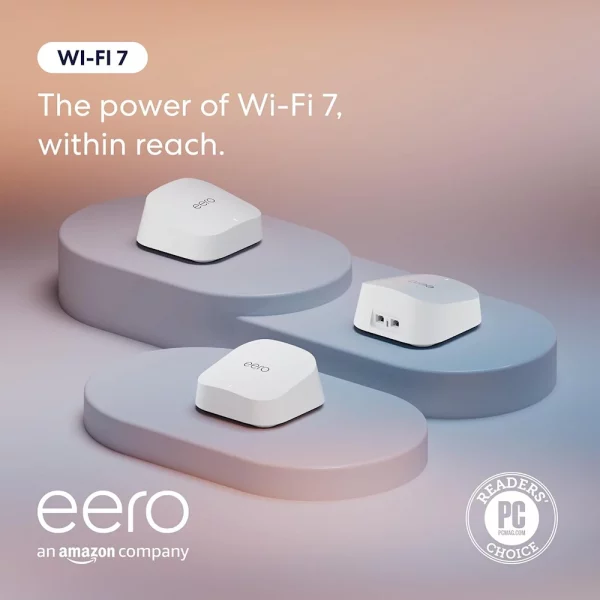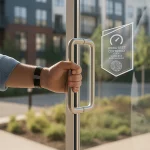Broadband ISP Brillband Launch WiFi 7 Routers as Standard on UK Plans

Glasgow-based full fibre broadband ISP Brillband, which was acquired by AllPoints Fibre Networks (APFN) back in October 2024 (here) and sells packages to homes over the same wholesale platform, has today announced that “every new Brillband customer” will receive their next-generation Wi-Fi 7 router as standard. No price hikes needed.
A number of broadband providers have launched WiFi 7 capable routers over the past year, although only a very few have made them the standard choice (e.g. YouFibre). Brillband has today joined this club and they appear to be shipping Amazon’s latest dual-band eero 7 routers to new customers “at no extra cost” (packages start at £38 per month for 900Mbps on a 24-month term).
The base eero 7 model is a dual-band unit that features 2 x 2.5Gbps Ethernet ports, 1 x USB-C port and wireless speeds of up to 1.8Gbps via the 2.4GHz and 5GHz bands (it doesn’t do 6GHz). Unlike other providers, Brillband say they also guarantee no mid-contract price hikes for 24 months.
Advertisement
Duncan Di Biase, CEO and Founder of Brillband, said:
“I founded Brillband to challenge the old way of doing broadband and give people a service that is fair and fast. Launching Wi-Fi 7 with eero 7 as standard for every customer ensures we stay true to our mission whilst delivering a significant upgrade to the service our customers receive.
Our aim is to future-proof our customers’ homes with our 900Mbps speeds delivered via the incredible Aquila network, combined with a WiFi standard that their devices will grow into plus network security without an extra cost.”
Mark is a professional technology writer, IT consultant and computer engineer from Dorset (England), he also founded ISPreview in 1999 and enjoys analysing the latest telecoms and broadband developments. Find me on X (Twitter), Mastodon, Facebook, BlueSky, Threads.net and Linkedin.
« O2 UK and Freshwave Expand 4G Small Cells in Perth, Scotland





















































Why are there so many ISP’s including eero’s? Do Amazon pay these ISP’s or do the ISP’s get a massive discount? Just interested in why so many provide these.
Usually bulk discounts plus amazon gets that lovely data from them
Because the ISPs are acting rationally. Right product, right price, easy support model.
If it’s the right answer for one ISP it’s likely to be the right answer for many.
eero aren’t paying ISPs to use their products. ISPs get a bit of a discount over retail through bulk orders – but the ISPs are also having to pay the Eero for Service Providers (ESP) license fee which retail customers don’t. eero is generally more expensive than other equal spec routers from other manufacturers.
eero are solid reliable devices, and ISPs don’t have to worry about device management and firmware rollouts etc like they might have to do with other solutions.
eero is easy for ISPs to deploy relative to other solutions, which lends itself nicely to the smaller ISPs who don’t have the knowledge and skillset to implement custom solutions like the big ISPs (EE/BT/Sky etc) can do, even if you are paying slightly more than you would with other solutions.
That and the fact that Amazon is a recognisable name to customers, other router manufacturers not so much.
And they’re still not provisioning on APFNs own network more than 3 months after they announced the completion of the merger of Fern’s networks. Think Broadband did an article on this back in August here:- https://www.thinkbroadband.com/news/allpoints-fibre-networks-the-fttp-network-built-but-hard-to-buy-access-to . The comment from from the CEO was no more than the twaddle you’d get from an evasive politician.
Big Dave, I am afraid I don’t have an answer for you on this. This decision sits away from Brillband. We have made it clear to APFN that when ready, we would love to be able to service customers on the APFN-owned infrastructure footprint.
“This decision sits away from Brillband”
But just to be clear – Brillband is a wholly owned subsidiary of APFN?
You are correct Big Dave. I sold Brillband to APFN and Fern group back in November 2024.
However we are separately run businesses. I have complete operational control of Brillband which enables me to continue to deliver the vision I set out to achieve which was to create a simple
Transparent offering for everyday broadband users across the UK.
The above was a redline for me when doing the deal.
As I have stated above we are super keen to be able to service the APFN footprint and conversations are on going. It would be great to connect on LinkedIn. I’d be happy to have a call and coffee to chat through things with you.
This would allow me to learn more about why you would like us on the APFN footprint and what we can do to get there.
“Why are there so many ISP’s including eero’s? Do Amazon pay these ISP’s or do the ISP’s get a massive discount? Just interested in why so many provide these.”
At a rough guess, amazon offer some volume discounts. But the main reason is that the Eero network is very reliable, underpinned by class leading security (inc. regular updates) and is easy to extend by consumers – so less calls to ISP help desks.
Eero also has an additional subscription service that offers very good parental controls and content filtering – it’s likely that subscription revenue is also shared with ISPs.
Richard this is precisely why we use eero. I appreciate that they aren’t everyone’s cup of tea, because they are a plug-and-play device that is designed to be simple to set up. However our target customer is your everyday broadband user.
We offer the security and parental services free of charge to our customers and pay a monthly charge to eero to do so.
“But the main reason is that the Eero network is very reliable”. No, they’re not. When TalkTalk were providing Eero devices, their community forums were always filled with complaints, and there was nothing the staff (TalkTalk OCEs) could do to resolve things due to the way Eero devices work. For example, if the router selects a bad channel and some of your devices are dropping, have poor signal or suffer from speed issues, then you can’t go into the router settings and change the channel because that option doesn’t exist. And power cycling or performing a reset won’t fix it, since the config is stored on Amazon’s servers. So you have to wait 24 to 48 hours for the router to hopefully change the channel on its own, but there’s a chance that it’ll select another bad channel or it’ll keep going from good to bad if you’re in a congested area.
Admittedly, Eero routers supporting WiFi 7 should have fewer issues. But any WiFi 6 or older devices might still be in for a bad time. Especially if the ISP only provides the base router, when Eeros are primarily designed for a mesh system (i.e., sold with one router and one or two extenders).
TalkTalk now mainly provide their Hub 3 router from Sagemcom, which drastically reduced the number of signal/device compatibility complaints. And you can just look on their forums if you doubt what I’m saying.
Does anyone know what actual backhaul and protocol Brillband have in place? PPPoE or DHCP?
At Brilband, we use the Aquila network. The backhaul protocol is dependent on the infrastructure provider. BT Wholesale connections are PPPoE, and CityFibre connections are DCHP.
I wish there was a better naming of standards, it feels like WiFi 7 should be Triband, without it how much does it really add I over WiFi 6 (6e being Triband)
MLO is the big step up with WiFi 7. MLO stands for Multi-Link Operations. It allows devices to use both WiFi channels simultaneously, reducing latency and improving throughput.
Not all Wifi7 routers are tri-band.